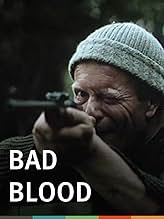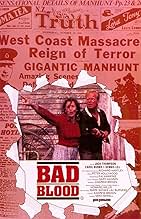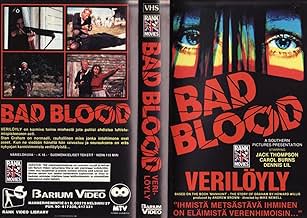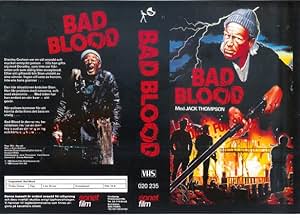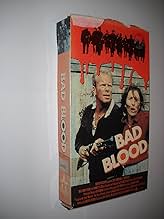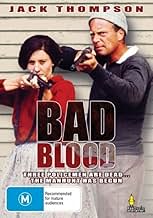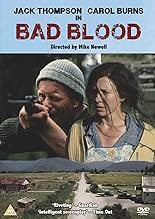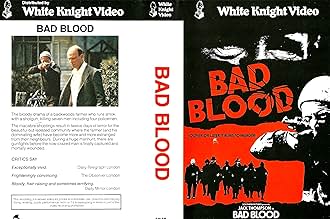Agrega una trama en tu idiomaDuring World War 2, a farmer in New Zealand murders seven people, and the police, along with local Maori trackers, hunt him in the bush country.During World War 2, a farmer in New Zealand murders seven people, and the police, along with local Maori trackers, hunt him in the bush country.During World War 2, a farmer in New Zealand murders seven people, and the police, along with local Maori trackers, hunt him in the bush country.
- Dirección
- Guionistas
- Elenco
Alan Jervis Wilks
- Ralph Frederic
- (as Alan Jervis)
- Dirección
- Guionistas
- Todo el elenco y el equipo
- Producción, taquilla y más en IMDbPro
Opiniones destacadas
This movie is boring and dumb. It is boring because they didn't take their time making it. They weren't thinking clearly. Nothing happens for the first hour. And then the wife shouts "POISONDOG" and then nothing happens for the rest of the movie. If you're a fan of the phrase "POISONDOG" or other phrases like that, or Jack Thompson II films, then check out the glory that is... Bad Blood! Otherwise avoid like plague. International. 2000.
Good Day to all the fine people on IMDb, I'd like to comment on the totally amazing movie that was written with such intensity and powerfully dramatic scenes.
This movie is one that not too many know of, and is truly a "hidden Jem" of Australian/NZ cinema.
The assortment of fine actors in this movie is truly compelling, from the talents of Jack Thompson (Star Wars) to the stunning Michael Teen (amazing!!), I cant believe Michael Teen was un-credited ...the skill brought to this part was INTENSE!!!...to say the least.
The scenery is very well shot, excellent camera angles from Mike Newell, brilliant direction.
This movie is one that not too many know of, and is truly a "hidden Jem" of Australian/NZ cinema.
The assortment of fine actors in this movie is truly compelling, from the talents of Jack Thompson (Star Wars) to the stunning Michael Teen (amazing!!), I cant believe Michael Teen was un-credited ...the skill brought to this part was INTENSE!!!...to say the least.
The scenery is very well shot, excellent camera angles from Mike Newell, brilliant direction.
Don't let the badly chosen B-movie-ish title fool you, this film is better than that. Set in rural New Zealand during the early stages of WWII in the 1940s, this film portrays the true story of Stanley Graham, a poor farmer with a wife and two kids. Unable to connect with the more well-bred surrounding community, and treated as outcasts (part of that being their own fault), he and his wife become increasingly paranoid about the bank and mortgage companies foreclosing on their small plot of land because of their ever-increasing debts. Making matters worse, the local police chief confiscates Graham's best firearm for use in the war, further enraging him and convincing him that the whole town is out to get him and his family. When the police finally do come to confiscate his land, he cracks up - killing the officers, fleeing, and becoming a fugitive in what became the biggest manhunt in New Zealand history.
The best thing about this film is its topicality, which extends far beyond the specific time and place portrayed here. There are parallels here to the cases of David Koresh and Randy Weaver here in the U.S. - two other crazed rural isolationists obsessed with firearms and perpetuators of violence when confronted by government officials. In fact, director Newell does a fine job of setting up in the beginning just how central a role firearms play in the daily life of this isolated community - they seem to be everywhere in the first few scenes, and even children play with toy guns intensely. A film like this pokes holes in the rhetoric of the NRA which says defiantly, "Guns don't kill people, people kill people." Well, yes, Graham is slightly nuts from the beginning, but how likely would the massacre he creates have been had he not had such easy access to the rifles, which play such a central part in his psychology? Also, it is interesting to note that Graham seems to be the kind of competent professional with a firearm that the NRA so often endorses as its core consituency, yet we don't seem him using it for any legitimate hunting purposes at all - only to kill other human beings.
Australian veteran actor Jack Thompson, as always, turns in a fine performance as Graham - totally immersing himself in the role of a cloistered-up nutcase with the us-versus-them mentality which would lead to an inevitable standoff with the outside world. Not surprisingly, he is much more adept at using his rifles than his pursuers, killing and wounding just about everyone he fires at, and creating an intense hatred in the posse organized to catch him.
Newell has done an excellent job of creating the small period details of the setting, from showing the organized women's war production to the local dance and rationing for the war in this community. Additionally, Gary Hansen's cinematography and camera-work has an exquisite feel for the New Zealand Landscape.
The major flaw is that here is a film which has traces of further ambitions beyond itself, but unfortunately did not capitalize upon them. The build-up of Graham and his wife's paranoia following real and imagined humiliations from the community in the first half is riveting. Unfortunately, the second half loses steam, as the organization of the posse and manhunt seems rather inconsequential and pedestrian. Graham supposedly became something of a folk hero to the country, but this is only hinted at by one or two lines from peripheral characters. Newell would have been wiser to expand this theme further: the pathology of Graham is definitely universal, and there are likely traces of it in any isolated rural community. That is much more interesting than an obligatory chase. However, these flaws owe more to the script than Newell's direction, which is very accomplished. Throughout the entire film, Newell's direction retains the conviction that we are witnessing important historical events unfolding. It is too bad that the script does not delve much deeper than the superficial storyline of a nutcase who kills several people and get chased by the police. Still worthwhile, though.
The best thing about this film is its topicality, which extends far beyond the specific time and place portrayed here. There are parallels here to the cases of David Koresh and Randy Weaver here in the U.S. - two other crazed rural isolationists obsessed with firearms and perpetuators of violence when confronted by government officials. In fact, director Newell does a fine job of setting up in the beginning just how central a role firearms play in the daily life of this isolated community - they seem to be everywhere in the first few scenes, and even children play with toy guns intensely. A film like this pokes holes in the rhetoric of the NRA which says defiantly, "Guns don't kill people, people kill people." Well, yes, Graham is slightly nuts from the beginning, but how likely would the massacre he creates have been had he not had such easy access to the rifles, which play such a central part in his psychology? Also, it is interesting to note that Graham seems to be the kind of competent professional with a firearm that the NRA so often endorses as its core consituency, yet we don't seem him using it for any legitimate hunting purposes at all - only to kill other human beings.
Australian veteran actor Jack Thompson, as always, turns in a fine performance as Graham - totally immersing himself in the role of a cloistered-up nutcase with the us-versus-them mentality which would lead to an inevitable standoff with the outside world. Not surprisingly, he is much more adept at using his rifles than his pursuers, killing and wounding just about everyone he fires at, and creating an intense hatred in the posse organized to catch him.
Newell has done an excellent job of creating the small period details of the setting, from showing the organized women's war production to the local dance and rationing for the war in this community. Additionally, Gary Hansen's cinematography and camera-work has an exquisite feel for the New Zealand Landscape.
The major flaw is that here is a film which has traces of further ambitions beyond itself, but unfortunately did not capitalize upon them. The build-up of Graham and his wife's paranoia following real and imagined humiliations from the community in the first half is riveting. Unfortunately, the second half loses steam, as the organization of the posse and manhunt seems rather inconsequential and pedestrian. Graham supposedly became something of a folk hero to the country, but this is only hinted at by one or two lines from peripheral characters. Newell would have been wiser to expand this theme further: the pathology of Graham is definitely universal, and there are likely traces of it in any isolated rural community. That is much more interesting than an obligatory chase. However, these flaws owe more to the script than Newell's direction, which is very accomplished. Throughout the entire film, Newell's direction retains the conviction that we are witnessing important historical events unfolding. It is too bad that the script does not delve much deeper than the superficial storyline of a nutcase who kills several people and get chased by the police. Still worthwhile, though.
True story set in a farming community in New Zealand during WW2 where the government decrees that all firearms must be collected by the police. However when the police approach increasingly paranoid, broke and struggling to keep his family fed Stan Graham's (Jack Thompson) he refuses to hand his weapon over and ends up killing seven people including a number of policemen. He is then subject to one of the biggest manhunt's in New Zealand's history.
Whilst certainly gritty and brutal with Stan depicted as a simple, but ruthless killer, you do feel a degree of sympathy for him and his wife as they are left with nothing and facing a bleak future. The local townsfolk are none too bright either, generally disliking the family and treating the hunt as a giant jolly never seemingly understanding what they have on their hands. The case became a considerable cause celebre and political hot potato in New Zealand as in some parts Stan was viewed as a hero in such socially troubling times. Quite excellent performances from Thompson and Carol Burns as his supportive but equally crazed wife, this is now rightly seen as a New Zealand classic.
Whilst certainly gritty and brutal with Stan depicted as a simple, but ruthless killer, you do feel a degree of sympathy for him and his wife as they are left with nothing and facing a bleak future. The local townsfolk are none too bright either, generally disliking the family and treating the hunt as a giant jolly never seemingly understanding what they have on their hands. The case became a considerable cause celebre and political hot potato in New Zealand as in some parts Stan was viewed as a hero in such socially troubling times. Quite excellent performances from Thompson and Carol Burns as his supportive but equally crazed wife, this is now rightly seen as a New Zealand classic.
Bad Blood is the true story of West Coast (New Zealand) Eric Stanley Graham who, during the 1940's shot dead several people in the small village of Kowhitirangi, and sparked NZ's biggest manhunt in history. The film is both atmospheric and disturbing, and is well focussed on Graham and his family, and their gradual alienation from the small community. The bush setting only amplifies this claustrophobia. Both well acted and scripted, Bad Blood is worth more than a look.
¿Sabías que…?
- TriviaActors playing shot policemen, who had to lie on the floor in pools of blood for long periods of time, to relieve the boredom, would sing and whistle the Monty Python song "Always Look on the Bright Side of Life", which had been at the time recently popularized in the movie La vida de Brian (1979).
Selecciones populares
Inicia sesión para calificar y agrega a la lista de videos para obtener recomendaciones personalizadas
Detalles
- Fecha de lanzamiento
- Países de origen
- Idioma
- También se conoce como
- The Shooting
- Locaciones de filmación
- Nueva Zelanda(filmed entirely on location in)
- Productoras
- Ver más créditos de la compañía en IMDbPro
- Tiempo de ejecución1 hora 45 minutos
- Color
- Relación de aspecto
- 1.85 : 1
Contribuir a esta página
Sugiere una edición o agrega el contenido que falta

